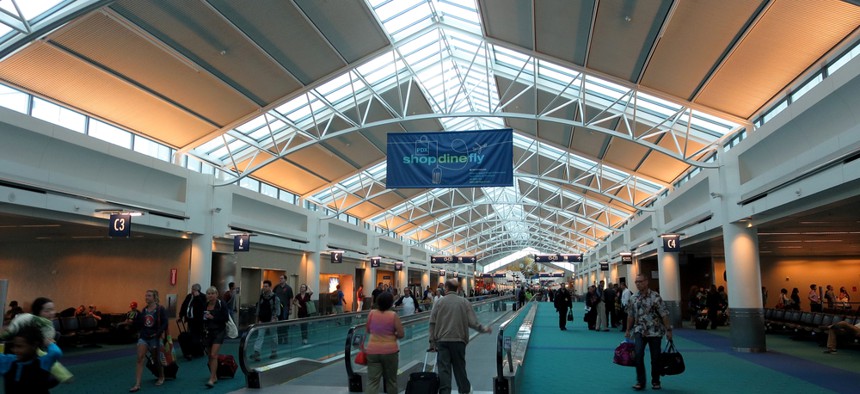Portland’s Pressing Civic Issues Are Bigger Than the Design of Airport Carpet

The carpeting at Portland International Airport has been a focus of local obsession, but Portland is also dealing with bigger issues. Eric Broder Van Dyke / Shutterstock.com
Among other issues in the City of Roses: An upcoming vote on Uber’s reintroduction and ‘Ban the Box’ discussions.
PORTLAND, Ore. — Everyone seems to be obsessed with the design of the airport carpeting in the City of Roses. When it was learned that the distinctive carpet pattern that a generation of local air travelers became accustomed to flying in and out of Portland International Airport would be phased out and replaced, there was a nostalgic outcry.
The obsession with the airport carpet has flooded certain corners of the Internet with feet-and-carpet selfies. The grand marshal of the upcoming Rose Festival’s Starlight Parade is, naturally, the airport carpet, nicknamed Peedee.
It’s the type of story that attracts only-in-Portland national headlines. (Perhaps Decemberists Day at Portland City Hall back in January would have received more attention if the band members were draped in airport carpet.)
But there are, naturally, big civic questions that are more pressing than properly bidding adieu to the old airport carpet.
Uber is at or near the top of that list. The ride-hailing transportation service that has disrupted the traditional taxicab industry in cities around the world has had a bumpy experience in Portland.
Back in December, Uber agreed to suspend its Portland operations until April amid regulatory conflicts with the city. It was the first time Uber voluntarily pulled back its operations from a city.

A Portland City Council vote is scheduled to vote April 15 on a measure that will allow Uber and competing ride-booking service Lyft to operate in the city as part of a three-month pilot program as rules are ironed out.
As Willamette Week recently reported:
Documents show the task force created by [Mayor Charlie] Hales and City Commissioner Steve Novick will set preliminary rules by April 9 for driver training and permits, background checks on drivers, and service for people with disabilities. It will then finalize those rules on July 15.
There are, of course, lingering questions about the reintroduction of Uber and similar transportation services in Portland. Insurance is one of them. A task force is considering a plan that would require a $2 million insurance policy for Uber and Lyft, Willamette Week reported.
Then there are questions of accessibility for those with mobility issues.
As the Portland Mercury wrote this week:
Portland City Code currently requires that 20 percent of cab companies' vehicles offer storage for wheelchairs, and comply with other standards for accessibility set by the ADA. At a moment when cabbies are insisting Uber and others play by the rules, that's a potential sticking point: Since Uber doesn't have a fleet of its own to regulate, it may be impossible to make the same requirement.
As part of its work, the task force is brainstorming options to avoid giving ride-share drivers an unfair competitive advantage by not paying for expensive ADA-compliant vans. And at a March 19 meeting, the group tossed around a possibility that would allow Uber to essentially hand off code requirements: Ride-share drivers could opt to contract with companies that own ADA-accessible vehicles, passing riders along to them.
Like other municipal governments around the nation, “Ban the Box” is another issue Portland leaders are dealing with. Nationally, the “Ban the Box” movement aims to change employment regulations to give former criminals a better shot at securing employment.
These laws limit how and when employers can consider an applicant’s criminal history in the hiring process. The specifics of these laws vary, but most of them require employers to remove from their job applications the checkbox asking about criminal history information. Only later in the hiring process can employers inquire into an applicant’s record, discouraging the practice of indiscriminately weeding out applicants with any criminal record.
Portland’s city government already has a “Ban the Box” rule for city employment hiring. Now Mayor Charlie Hales wants to make "Ban the Box" the norm for private-sector hiring in the city as well.
As The Oregonian reported recently:
Employers, including private businesses with as few as six employees, would be prevented from conducting a background check or asking about a candidate's criminal history until there's a conditional job offer on the table. Exceptions include law enforcement positions and jobs in which a criminal background or the nature of a felony record would affect the candidate's job qualifications.
Check out the mayor’s recent Twitter town hall session on "Ban the Box."
A statewide “Ban the Box” bill has been introduced in the Oregon House of Representatives.
(Top image by Eric Broder Van Dyke / Shutterstock.com; second image by Josemaria Toscano / Shutterstock.com)






